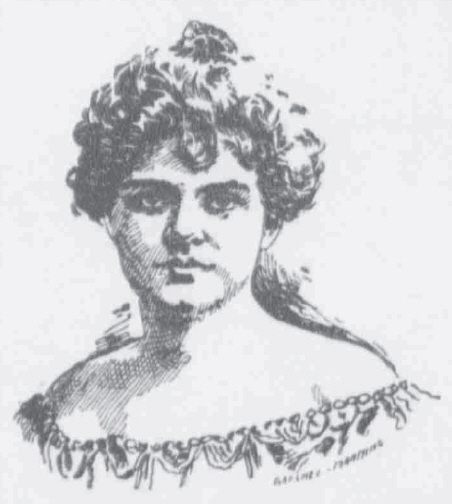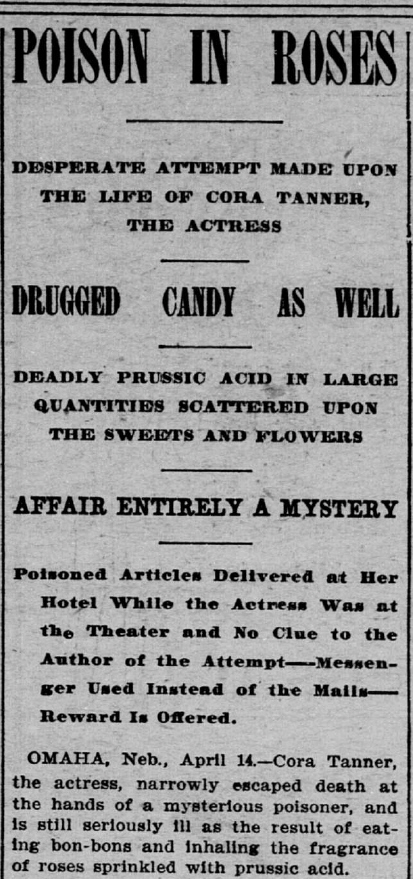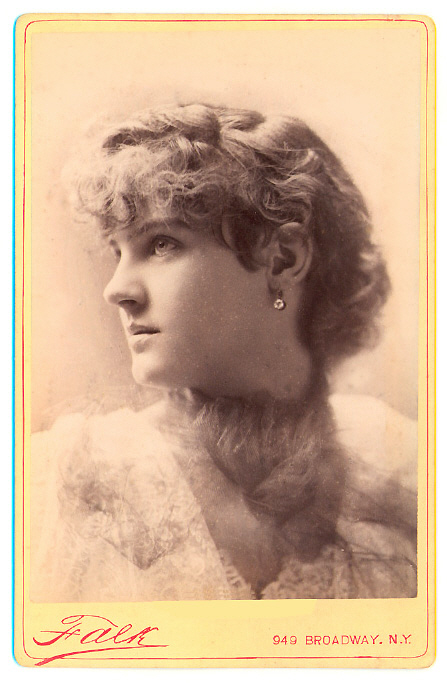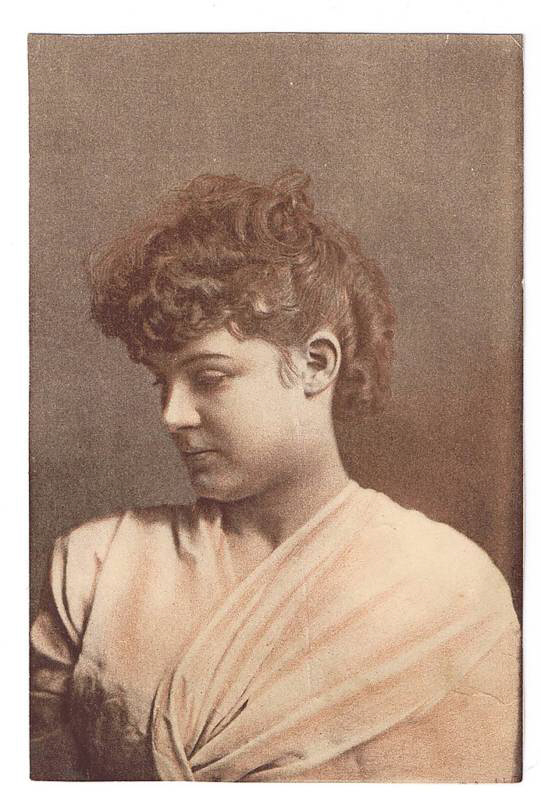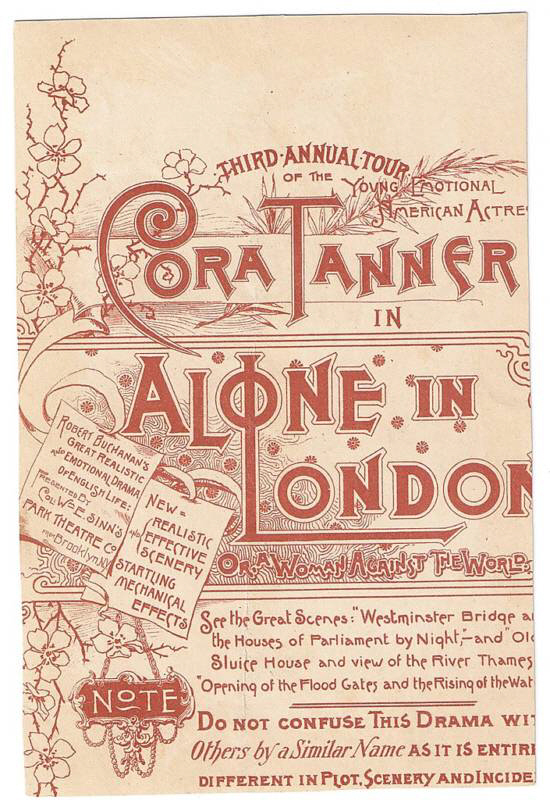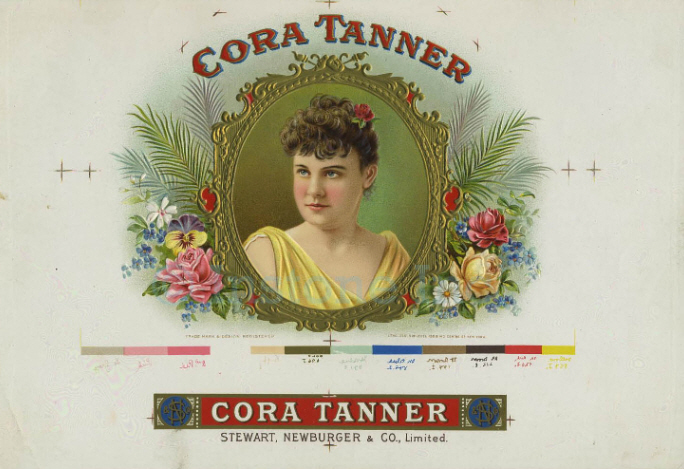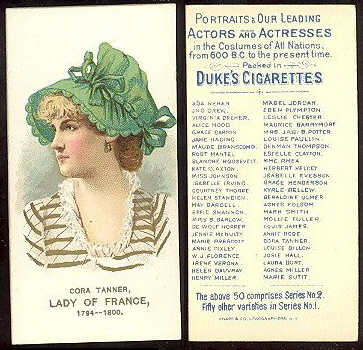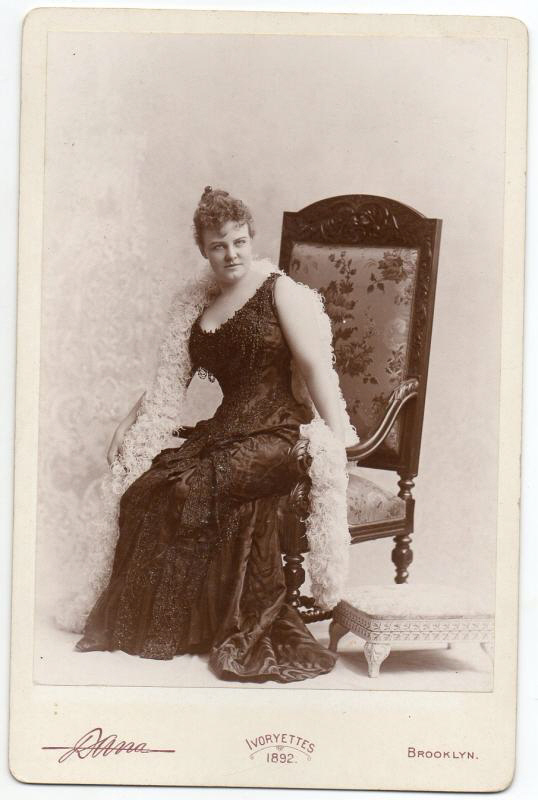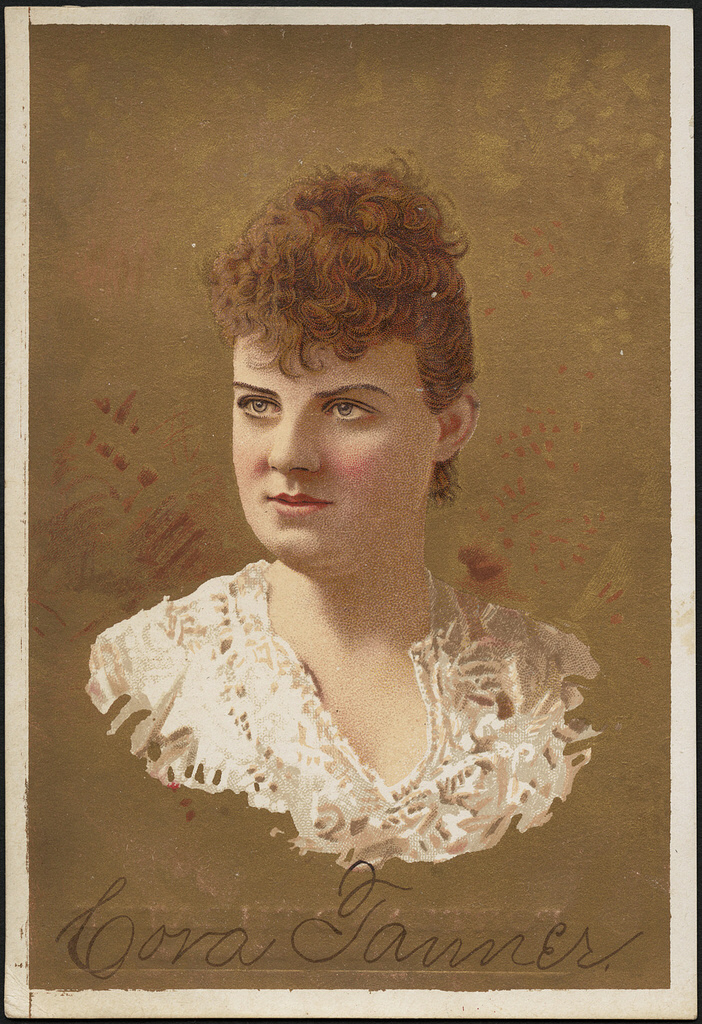|
Play List: 4. Corinne 7. The Mormons 9. Lucy Brandon 10. Storm-Beaten 11. Lady Clare 13. Bachelors 14. Constance 15. Lottie 16. Agnes 17. Alone in London 18. Sophia 19. Fascination 20. The Blue Bells of Scotland 21. Partners 24. Angelina! 25. The Old Home 26. A Man’s Shadow 27. Theodora 29. Clarissa 30. Miss Tomboy 32. Sweet Nancy 33. The English Rose 36. Marmion 37. The Gifted Lady 38. The Trumpet Call 39. Squire Kate 40. The White Rose 42. The Black Domino 44. The Charlatan 45. Dick Sheridan 47. Lady Gladys 48. The Strange Adventures of Miss Brown 49. The Romance of the Shopwalker 52. Two Little Maids from School ___ |
|
ROBERT WILLIAMS BUCHANAN (1841 - 1901) |
|
|
|
|
|
|
|
|
ALONE IN LONDON IN AMERICA - continued
The New York Times (26 January, 1887) Miss Cora Tanner will be seen in her familiar portrayal of Nan in “Alone in London” at the Grand Opera House next week. Mr. French desires the fact recorded that Miss Tanner is not an Englishwoman, as somebody has said, but a native of Ohio. ___
The New York Times (1 February, 1887) “Standing room only” was the announcement for late comers to the Grand Opera House last night, where Miss Cora Tanner began most successfully a week’s engagement in Robert Buchanan’s “Alone in London,” with its surprising mechanical effects and realistic London scenery. The house was very enthusiastic, but the gallery asserted itself with the noise of a British pit, and several times the disagreeable whistling and cat-calls had to be hissed into quiet. The noise was, however, simply the result of exuberant appreciation. Miss Tanner was called before the curtain after every act, and though it was 11 o’clock before the melodrama ended with the villain’s acrobatic death the house waited to tender a general recall. ___
The Brooklyn Daily Eagle (13 February, 1887 - p.1) A COOL HEADED ACTRESS. Exciting Scene at a Performance of An exciting scene occurred at a matinee performance of Colonel Sinn’s “Alone in London” at the Academy of Music, Jersey City, yesterday afternoon. The theater was crowded, the majority being ladies and children. Just before the curtain rose for the third act a 14 year old girl, whose name was not learned, fainted and fell from her seat in the gallery. She was at once picked up and carried downstairs. At this juncture a crowd of boys, curious to ascertain the cause of the commotion, congregated about the stairway, and soon the house was in a state of excitement, the entire audience springing to their feet. An injudicious word at this time would have caused a disastrous stampede. Miss Laura Lee Claire, one of the company, was equal to the occasion, pushing the curtain aside, facing the audience and crying out for them to sit down. Her action was seconded by other members of the company, Manager Henderson and the attaches of the theater. The orchestra struck up a lively air and the attention of the people was directed to the stage, the excitement quietly subsiding. Miss Claire was greeted with rounds of applause, and the remainder of the play was given without interruption. ___
The New York Times (15 February, 1887) Miss Cora Tanner presented “Alone in London” last night at the Windsor Theatre to an audience that packed that roomy house from orchestra to gallery. Miss Tanner as Annie Meadows, the farmer’s young daughter, who is won by a worthless scoundrel, taken to London, and there deserted, only repeated the success she has made in this part. The character of the villain—Richard Redcliffe—was ably interpreted by Mr. C. G. Craig, and Leonard Grover, Jr., as the philosophical thief made the audience roar. The scenery was good, and the great sluice scene, with real running water, was much applauded. |
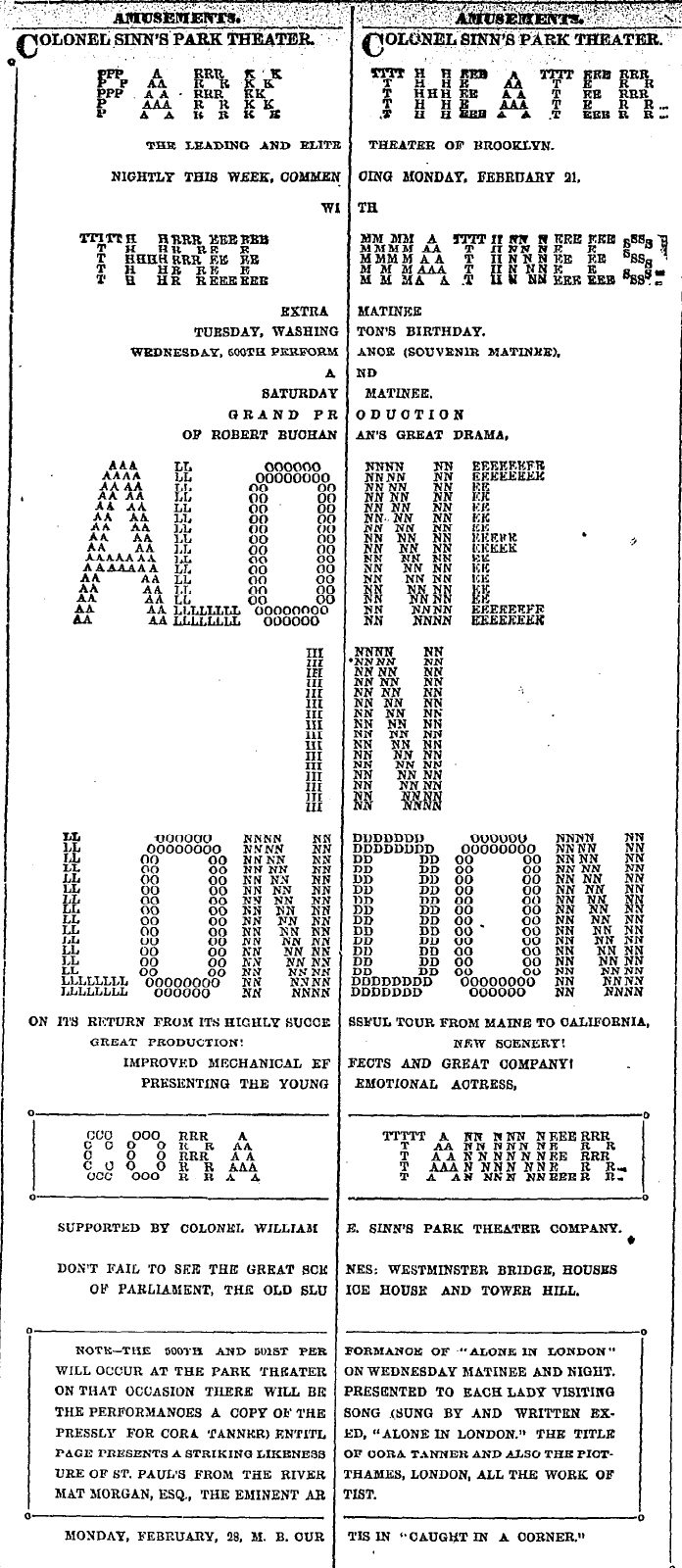 |
|
[Advert from The Brooklyn Daily Eagle (20 February, 1887 - p.13).]
The Brooklyn Daily Eagle (22 February, 1887 - p.3) PARK THEATER. Robert Buchanan knows his public and is careless of his critics, and these facts inure to his success. It would be an easy matter to pick flaws in his drama, “Alone in London,” that is played at the Park this week, to say that his motive wants originality and that as a literary work it is unpretentious, but what matter, at least to him and the manager and actors of his play, so that he reaches the hearts and pockets of the people? For between hearts and pockets there should be an intimate relation. The house was crowded to the doors last night, and from the managerial standpoint that is the best criticism on a performance. The making of sympathy for a good woman by neglectful and cruel treatment of her, the hatred of vice and meanness, the admiration for cheerfulness and virtue, practiced in spite of repressive circumstances— audiences have been made to yield these homages since the time that drama was, with a result of moral benefit to themselves and of financial benefit to play writers and theater managers. “Alone in London” tells an old story with strength and address; the public warms to the gentle, the steadfast and the heroic in it, and it lends no countenance to the evil that stalks through it, apparently on the road to success, but only to end in overthrow. There are bits of interesting portraiture in it, too, and the snake swallower, his companion, the pot boy, the humorous old lodging keeper, the philosophic thief and the poor, limping pedler of chickweed, are worthy to have stepped from the pages of Dickens. In the setting one glimpses high and low life and the haunts and habitats of all sorts and conditions of men, and in the rescue of the heroine from the rising tide there is a coup du theatre and a display of the scenic and mechanical resources of the stage that have done much to make the fortune of the piece. The play has been improved since last season by more compressed and spirited action, the company is excellently chosen and the setting is better than ordinary. Miss Cora Tanner, who plays the heroine, has beauty, intelligence and emotional power. C. G. Craig exhibits the villainy of Redcliffe, but he should remember that even professional villains have their human moments at times and are not always cold and sneering. Leonard Grover plays Jenkinson with unction, and there is good work in the acting of W. T. Grover, Harry Davies, formerly H. Rees Davies, Alfred Fisher, W. A. Sands, Grace Pauling, Ada Dwyer and Laura Leclaire. Next week M. B. Curtis will be “Caught in a Corner.” ___
The New York Times (1 March, 1887) At Niblo’s Garden Miss Cora Tanner appeared last night in “Alone in London,” and was received by a very large audience. Miss Tanner was effective as she always is in this play. Mr. Leonard Grover, Jr., as the philosophical thief made lots of laughs, and, as Richard Redcliffe, the wily adventurer, Mr. C. G. Craig was efficient. ___
The New York Times (26 June, 1887) There have been three “Fascination” plays up to the current year. Audiences managed successfully to resist all. The fourth and the latest, given a trial a short time ago, may triumph. The Sinns, father and son, think of putting it on the road. But next season they will continue Cora Tanner in “Alone in London.” Its last season was better even than its first. ___
The New York Times (2 August, 1887) Little Mabel Pollock is to travel next season in support of Cora Tanner (Mrs. Col. W. R. Sinn) in “Alone in London,” and Miss Evelyn Pollock is to go with a “Michael Strogoff” company. ___
St. Paul Sunday Globe (13 November, 1887 - p.1) BIG THEATRICAL WEEK. Cora Tanner, in Alone in London, at This evening Robert Buchanan’s great drama, “Alone in London,” will be produced at the Hennepin Avenue theater with a remarkably strong cast, and with all the scenic and mechanical effects that go to make this powerful drama—representing romantic phases of life—the most realistic and intensely interesting play of its kind on the stage. The piece is an admirably constructed story dealing with the types of living characters, and it possesses all the elements which go to make a perfect play. The story itself is simple, dealing as it does with the adventures of a young country girl, who rejects an honest miller to marry a more fascinating adventurer, who, in the guise of an honest man, turns her foolish head and wins her heart. After marriage she finds that her husband is a swell mobsman, the associate of thieves and blacklegs, and she is in their company subjected to all the perils of a great city. She is protected, however, by a poor street waif whom she had befriended in happier days, and, when the clouds that darken her life are most gloomy, her country lover turns up to rescue her from the perils by which she is surrounded. ___
St. Paul Daily Globe (14 November, 1887 - p.3) Sunday night amusements are in great favor, if last night’s audiences are any criterion. Every Theater was crowded to suffocation, but the plays were given to enthusiastic and not noisy audiences. “Alone in London” packed the Hennepin Avenue with the largest audience it has ever contained. Not an inch of available room was room left unoccupied. before such an audience this play could have been nothing but a success. Everything was applauded, and everything received with the greatest enthusiasm. The company is a good one, and the play is put on with every desirable effect in the way of stage setting. It will be run throughout the week, and will hold up its share of the city business. . . . MISS CORA TANNER. Miss Cora Tanner, the emotional actress, who stars in “Alone in London,” arrived in town yesterday and is stopping at the West hotel. This “Alone in London” organization is one of the largest on the road, and includes in all thirty-five members. It is an extremely popular play, written by Buchanan, and the piece in which Miss Tanner first made her reputation as an exponent of the melodrama. It is generally supposed by the public that Miss Tanner is a native of Brooklyn, from her long and close connection with the Park theater of that city, which is owned by Colonel Sinn, who first produced “Alone in London” in America, and who is fortunate in being the husband of this popular lady, but the real place of her birth was Cleveland, O., and she has lived in Chicago and other Western cities beside. She was the original princess Ida in this country, and ere venturing on her present line of business had gained quite a reputation as a singer. Her reception room in the hotel is one of the handsomest in that spacious hostelry, and had a home like look from the books and papers of the actress scattered around. Seen off the stage, Cora Tanner looks just as attractive as when before the footlights, but her beauty is greatly enhanced by the modesty of her manner and the evident kindliness of her disposition. In fact, in private life she is the very last person in the world that would ever be suspected of being an actress, as there is no glamour or show about her, simply the dignity and sweetness of a true woman. She is greatly interested in her new play, “Fascination,” but owing to fatigue and preparing for the night’s performance had to put off telling all about it and future plans till another day during this week. ___
St. Paul Daily Globe (15 November, 1887 - p.3) Miss Cora Tanner and the sensational drama “Alone in London,” now running at the Hennepin Avenue theater, must be registered as a decided success. The audience Sunday night was the largest that has appeared at any theater in the city during the present season, every seat, loge and box being occupied and much of the standing room utilized. Last night Miss Tanner received another ovation, the house being full and the audience enthusiastic. ___
St. Paul Daily Globe (19 November, 1887 - p.4) A TALK WITH CORA TANNER. Miss Cora Tanner was “at home” yesterday afternoon in her pretty reception room in the West hotel, and pleasantly chatted on all the live and dead subjects of the day, that is to say, from her new play “Fascination” to the Chicago anarchists. She is a very interesting woman, as her life has been thrown in the company of many distinguished people. As a child she intimately knew Mary Anderson, supporting her at McVicker’s theater in Chicago quite often. She thinks Mary a great artist, but one who has but little pathos in her nature. With Roland Reed she has also been associated professionally, and Buchanan, who wrote “Alone in London.” He is also author of “Fascination,” the next play Miss Tanner stars in, and which largely engrosses her present attention. This play was put on the boards of her husband’s theater in Brooklyn last season for one week, and made instant success. In her new role Miss Tanner will do two very interesting things—step completely out of melodrama into genteel comedy, and also appear in boy’s costume. This latter seems to be all the rage at present. Emma Abbott in the “Good Devil” and Mrs. Langtry in her last thing out appear in pants, but neither of these women can approach Miss Tanner in masculine attire. “My husband,” said Miss Tanner,” has been trying to get Osmond Tearle and his wife to support me, but I greatly fear they can’t, on account of previous English engagements. Charley Coote will take the part of Rev. Mr. Colley, and the first performance will be given in the Fourteenth Street theater, New York, Sept. 10, the engagement to last seven weeks. The dates are already signed for the travelling show all next winter and far into the spring.” The Hennepin Avenue theater she characterizes as beautiful and ahead of many New York houses. She is agreeably surprised at the reception given her here, and intensely anxious to know all about the rivalry between Minneapolis and St. Paul, and if there is really any such thing. ___
The New York Mirror (19 November, 1887 - p.6) Filthy Dressing-Rooms. We take satisfaction in presenting the following letter, which has been sent to us for publication by the members of the Alone in London company: DUBUQUE, Ia., Nov. 6, 1887. Although THE MIRROR has at frequent intervals during the past few years called attention to the disgraceful condition of the dressing-rooms provided in various theatres throughout the country, the foregoing letter of complaint is the first real token we have had of a desire on the part of the members of the profession for a reform in this direction. The statement of the Alone in London company is straightforward and to the point. If the management of the theatre in Peoria has any self-respect or any regard for the health and comfort of visiting professionals, the dressing-rooms will be promptly put into decent and habitable condition. ___ [A further article from The New York Mirror regarding the dressing-room question was published in the issue of 10th December, 1887 and is available here.] ___
The Brooklyn Daily Eagle (21 February, 1888 - p.3) PARK THEATER. Cora Tanner’s charm of manner and appearance and the copiousness of incident in Robert Buchanan’s play save and popularize “Alone in London.” The play is disappointing as a literary production; in fact, for an author who has done such singularly good work as Mr. Buchanan, who has displayed such original ideas as may be found in his novels and such delicacy of thought as mark his poems, it is coarse and conventional. The fact that such a play succeeds for three seasons proves the necessity of action in the drama. The most melodious dialogue, the most charming stage pictures, the brightest and most interesting accessories go for naught unless the stage folks hustle around and do something. They are doing something incessantly while the curtain is up on “Alone in London;” making love, committing deep, dark, terrible crimes, masquerading, begging, plotting revenge, trying to kill and getting killed. Time is duly measured off in which the heroine shall lament her bitter fate, and when the house is dotted with hankerchiefs low comedy enters with a bounce and the chuckle chokes the sob. It is in the truest sense an “effective” drama, and Mr. Buchanan has earned by it the title of playwright, which may compensate him for the abandonment of his old position as man of letters. The company and the setting that give form to his story have been picked with care and taste. In C. G. Craig, Leonard Grover, Alfred Fisher, Maggie Holloway, Ada Dwyer, W. A. Sands and others Miss Tanner has capable associates and supporters and the play moves with the spirit and precision that come of thorough practice. The attempting drowning in the sluice house and the foiled robbery in the last act were loudly applauded. Next week a new company will turn on some “Natural Gas” that is said to resemble laughing gas in its effect on the audience. ___
The New York Times (28 February, 1888) MUSICAL AND DRAMATIC NOTES. Cora Tanner, in “Alone in London,” was the attraction at Niblo’s last evening. The audience was large and enthusiastic. The engagement will continue this week. ___
The New York Times (14 March, 1888) The east siders proved their fondness for the theatre last evening by giving Miss Cora Tanner, supported by Col. Sinn’s company, in “Alone in London,” a very fair-sized audience at the Windsor Theatre. Miss Tanner was called before the curtain several times. The applause was much louder than it would be supposed an audience of 400 could produce. ___
The New York Times (9 October, 1888) Robert Buchanan’s melodrama “Alone in London,” in which Cora Tanner made some fame and considerable fortune, is the attraction at the Windsor Theatre this week. Last evening the audience was quite large, and it showed its enthusiasm without stint. Miss Ada Dwyer, who formerly had the part of Tom Chickweed, now personates the heroine. Her acting is marked by intelligence and much emotional power, and she wins fairly the marks of favor with which she is greeted. The part of Tom Chickweed is taken by Miss Madge Carr, who also does well. The remaining characters are portrayed by the same company that supported Miss Tanner, including Frank L. Davis, Leonard Grover, Jr., C. G. Craig, Alfred Fisher, Miss Marian Strickland, Miss Maggie Holloway, and Miss Marie Dudley. The scenic effects remain as picturesque and attractive as ever. |
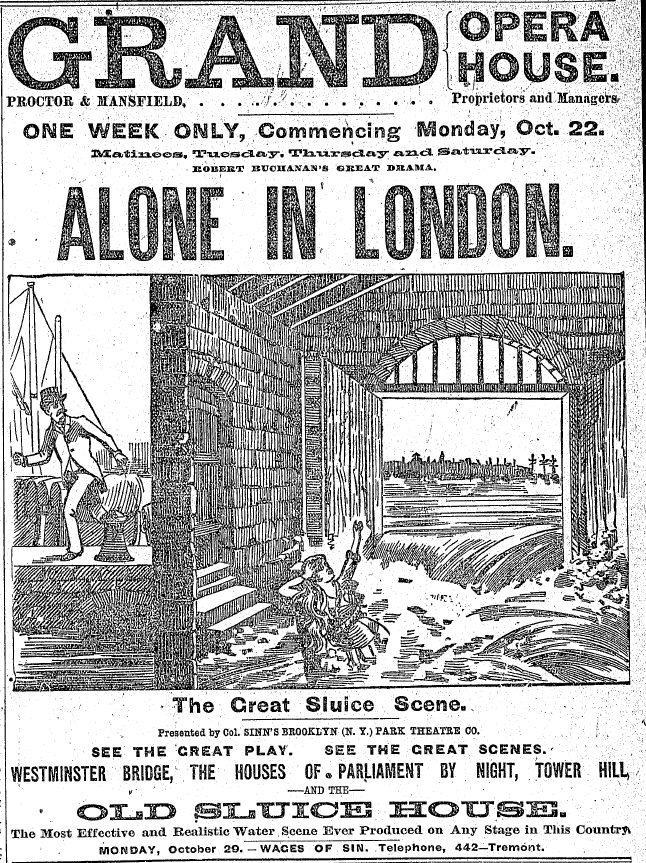 |
|
[Advert from The Boston Sunday Globe (21 October, 1888 - p.10).]
The Boston Daily Globe (17 October, 1889 - p.6) The attraction at the Grand Opera House next week will be “Alone in London,” with a strong company, plenty of beautiful scenery by Goatcher, music by Theodore Bendix, and the entire production under the personal superintendence of Mr. Robert Coote, who has been identified with the play from its first production, and who was associated with Robert Buchanan, the author of its original presentation. ___
The World (New York) (5 November, 1889) “Alone in London,” the drama of London life by Robert Buchanan in which Cora Tanner toured for three seasons, was given an excellent production at the Third Avenue Theatre last night. There was not even “standing-room only” when the curtain rose. _____
After starring in Alone in London for over two years, Cora Tanner’s next role was in another Buchanan and Jay play, Fascination, with which she had another success, touring America from 1888 to 1890. In October, 1890 she survived a fire at the Leland Hotel in Syracuse, New York. In 1893 Col. Sinn tried to get their marriage annulled, on the basis that Cora Tanner’s divorce from her first husband had never been finalised, but the court ruled otherwise. I’ve been unable to find a picture of Col. Sinn and the only hint as to his appearance occurs in one of the court reports: “The other witness was Dr. C. Fred Farlin, the first husband of Cora Tanner. He lives in Rochester, N.Y., and is a big fat man, somewhat after the style of Col. Sinn himself.” She also survived this rather ungallant comment in the Nebraska State Journal (8 April, 1894): The crowning absurdity of the season is the news that Cora Tanner has decided to quit emotional roles and go into lyric drama. Now Cora can never be a dramatic actress; she is too stout. Emotional actresses can be as stout as they wish, but lyric heroines must be slender. Actresses so often seem to have an ungovernable desire to do the things they can't. In 1898 Cora Tanner returned to Alone in London. The Brooklyn Daily Eagle (5 March, 1898 - p.7) BROOKLYN WORKMEN FAVORED. Miss Tanner Having “Alone in London” Cora Tanner, the well known actress has given out the contracts for the construction of the scenery for the revival production of her old successful play, “Alone in London,” which is to be seen at the Bijou in a few weeks. The play has not been seen in some years and the old scenic effects have been long since destroyed. When she decided to put the play out again, Miss Tanner invited New York, Philadelphia and Brooklyn men to figure. When the bids were opened it was found that the figures of the Brooklyn men were the highest, but the actress decided that she would have the work done here. The work of construction was given to Louis Horn of the Bijou and it is now being pushed to completion in the scene dock of the theater. The scenic work was awarded to Seymour D. Parker and his work is also being done at the Bijou paint frame. Both of the constructors have a large force of men at work and no time is being lost. Miss Tanner decided that the money should be spent in the city of her home although the out of town figures were much lower. ___
The Sentinel (Washington, D. C.) (16 April, 1898) THEATRICAL. |
|
or back to Alone in London main menu
|
|
|
|
|
|
|
